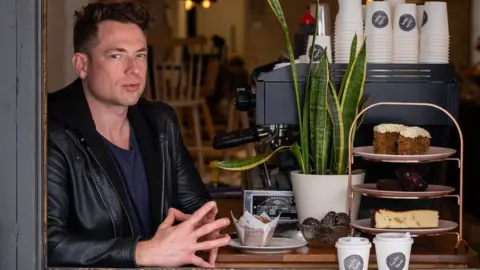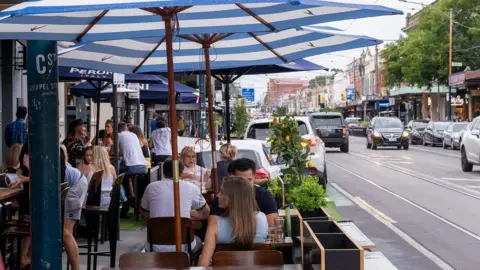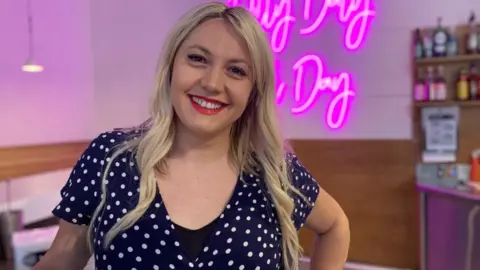Getting 'crushed' on Melbourne's path to coronavirus success
 Tavis Rogerson
Tavis Rogerson"It was pretty grim. There was a lot of sadness in people's eyes. A lot of fear of the unknown."
Matt Lanigan is describing life on Melbourne's Chapel St during the city's recent four-month lockdown.
"The streets were completely deserted. It was like something out of [post-apocalyptic film] Mad Max," says Mr Lanigan, who owns cafe Lucky Penny on the iconic shopping strip.
Melbourne first went into lockdown in March, but its second, which began in July after a fresh Covid outbreak, was a bigger blow. That lockdown went on to become one of the longest and strictest in the world.
"It was brutal," Mr Lanigan says of trying to keep his business afloat. "It was like I was in a boxing match and I just got knocked to the floor. For a moment there, I felt like maybe it wasn't worth getting up."
But things are slowly turning around. On Friday, Melbourne and the state of Victoria achieved one measure of "elimination" of the virus - 28 consecutive days with no new infections. After seeing daily cases soar above 700 in July and August, the city is seen as an example for the rest of the world on how to handle a second outbreak.
Now on reopened Chapel St, music and chatter fill the air as people enjoy their Sunday brunches. Customers are coming in and out of shops on both sides of the road. The scene is very Melbourne.
Despite the high spirits, everywhere you look there are signs of how battered this city has been.
 Tavis Rogerson
Tavis RogersonMany businesses are still shut, some displaying "for lease" signs. Others are open but half empty. Placards saying "support local" dot Melbourne.
Not far from Chapel St, Melissa Glentis runs a cafe called Dilly Daly.
"Most of Melbourne was feeling just crushed," she says. "Our spirits were crushed, the streets were dead. I didn't actually want to come to my own business, which I've worked [on] my entire life to get to this point.
"It was a roller coaster of emotions. There were days where we just didn't want to get off the couch. I just wanted to stay home and cry."
The lockdown divided the city between those who supported it and those who said it was too extreme and too long.
The huge public health benefit has also come at a huge cost. Melbourne's economy could be reduced by up to A$110bn (£60bn; $81bn) over the next five years because of the pandemic. Victoria is projected to lose up to 325,000 jobs this year alone, according to a report by the City of Melbourne.

More on Melbourne's lockdown:

Mr Lanigan says his business barely survived - he offered takeaway services, created an online grocery store, and took up a government subsidy called JobKeeper.
"We could have easily just shut the doors. Instead we decided to push harder." Part of that, he says, was deciding to use his takeaway window as a way to keep the local community connected.
"They would come down and have a five or a ten-minute conversation [at the window]. It was their one piece of social interaction for the day."
It became clear through these conversations how dire the situation had become for many people, he says.
"We were hearing about people not having food on their tables. Every second person you spoke to was struggling with something. I could see the fear everywhere. From people telling me 'I'm missing my mum, I'm worried about my grandma,' to 'I've had enough'."
After a three-hour conversation to talk a friend out of suicide, he decided to take a mental health first aid course online.
"He had a breakdown and he was on the edge of killing himself," Mr Lanigan says. "He'd lost his events company, and there was no roadmap, no direction, no hope."
"The conversations I was having sitting at that window on the street every day, it was evident that people needed help, and I needed to be more qualified and confident to give it."

He says the real economic and mental health toll will become clearer in the months to come, especially when government wage subsidy schemes end.
"I think you'll see the real fallout in March, April and May next year. That will be when you get a real understanding of the unemployment figures, a real understanding of the mental health toll, a real understanding of the suicide figures," he says.
On Friday, Victoria's chief health officer Brett Sutton said the 28 days without a new infection was "rightly worthy of celebration", but acknowledged many had "suffered enormously". More than 800 people in the state had died, he added.
"So it's only right that many of us still feel anxious, angry or burdened by sadness," he tweeted.
Ms Glentis says that reopening feels like she's starting from scratch, with the shop sometimes empty on weekdays.
"The business was decimated. We've lost a lot of our regular customers and our corporate customers in the area. A lot of the residents moved. It means that we literally have to start from zero again."
"It is a little bit soul-destroying, but I am the most positive person, and we will work as hard as we can to get back to where we were."
Ms Glentis says she is anxious about another outbreak, however.
"What worries me the most is having to do this all over again. I don't think on a personal level, I will be able to get through this again."
Information and support: If you or someone you know is feeling emotionally distressed, these organisations in the UK offer advice and support . If you are in Australia, you can call Lifeline at 131114, Kids Helpline at 1800 55 18000 or visit the Beyond Blue website.
